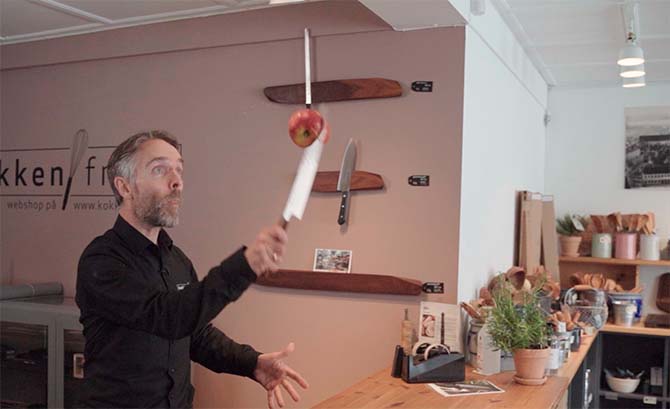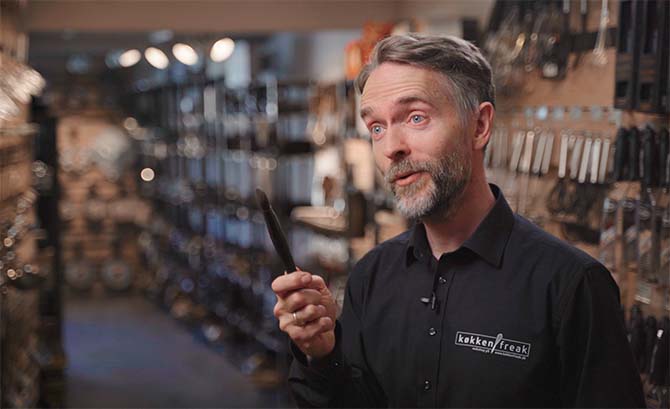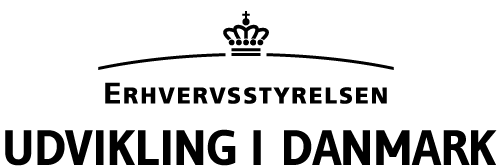NB. Udbyderen af servicen sætter cookies på din computer, når du afspiller eller deler videoen. Læs mere om cookies.
Can the EU make a difference to the retail trade when we get right down to street level – down to the goldsmith, the baker, and the local materialists? Yes, is the answer in four South Funen municipalities. Here, over the past five years, the EU project Styrket Erhverv I Gadeplan (SEIG) has pumped ideas and digital competences into 300 businesses – and created new vitality in the municipalities’ town centres.
Martin Fischer, who runs the kitchen equipment store Køkkenfreak on the square in Svendborg together with his wife Line, puts it this way:
“The day-to-day running had taken over a bit, and we had difficulty finding the motivation to grow. Then SEIG kicked in the door and invited us into a growth mindset. Growth has become part of the daily operation, and we are better prepared to face the new societal challenges – price increases, uneven supplies, inflation, and general consumer distrust.”
In Svendborg Municipality, which in 2021 had a net influx of more than 600 citizens, mayor Bo Hansen experiences it this way:
“Until 2017, we had for many years had a stagnant or slightly declining population. We have managed to turn it around, and I associate that with the optimism that SEIG has helped to create. We’ve got something to rally around.”
380 managers and employees from 300 companies have participated in the project, which has had a tremendous impact: Over 95 per cent of the companies report strengthened competences, especially in the digital area, and more than 80 per cent have started new initiatives after the course in SEIG.
Competences for the fight for survival
A research report from 2021 points to the project’s strength: Tailored courses, the building of close networks as well as competent and persistent consultants who have motivated and guided the busy shopkeepers and their employees through the courses. The result is the professionalisation and digitisation of a company group which is significant and has attracted attention across the country.
Helge Padegaard, project manager at SEIG:
“The small independent shops are in a constant battle for survival, and they have learned to grow and renew themselves with new, digital competences. Many of them started at a low digitisation level, but now most physical stores in the four municipalities also run a web shop.”

Martin Fischer has raised awareness of his business Køkkenfreak with hundreds of humorous how-to videos demonstrating how to use kitchen tools. He runs the business with his wife, Line Fischer. Photo: Rostra Kommunikation
Shop owner: The positive is important
At Køkkenfreak, Martin Fischer started producing videos for various SoMe platforms, especially Facebook, where he – usually with a touch of dry humour – explains how to use the kitchen utensils sold in the store.
“At SEIG, we learned that it’s fun to grow and to look forward, and that it’s all about the right attitude. That’s why I started making the videos, and I make sure that there is always a positive angle because customers prefer to shop where there is a good atmosphere,” Martin Fischer says.
The four South Funen municipalities that have been partners in SEIG are Svendborg Municipality, Langelands Municipality, Ærø Municipality and Faaborg-Midtfyn Municipality.
On Ærø, business and tourism manager Chris Hammeken is not shy of referring to SEIG as a boost for the island municipality’s retail trade:
“If we hadn’t had SEIG, we wouldn’t have had the shop life we have today. Four years ago, everyone had heard of that internet trade. Many thought it would be a big challenge, but SEIG made it simple, and today, some of our stores even earn more from the web shop than from the physical store.”
The head of business and tourism predicts that in the future, shopkeepers will have to continuously improve their competences and be ahead of the game:
“When you are online, you compete with the whole world. When you are not online, you just have a shop on a street with opening hours from 9 to 17, where a limited number of customers came by. And one day you will have to close the shop.”
The EU’s Social Fund has contributed with almost DKK 10 million to the EU project over almost five years.
“It would never have become a reality without the help from the EU because the municipalities cannot carry out this task themselves,” project manager Helge Padegaard says, who has experienced great interest from many municipalities from all over the country.
And on Bornholm, SEIG has been a role model for a similar effort with a COVID-19 restart focus for approx. 100 shops at street level.

Martin Fischer and his wife Line have run the kitchen equipment store Køkkenfreak in Svendborg for seven years. With the help of the EU project Styrket erhverv i gadeplan, the business is today professionalised and completely digitised, and the new competences will help the Fischer couple through inflation, rising commodity prices and supply uncertainty. Photo: Rostra Kommunikation
FACTS About Styrket erhverv i gadeplan (SEIG)
The SEIG project began in November 2017 and ended in September 2022. The objective of the project is to improve the digital competences of employees and managers within, e.g., e-commerce and digital marketing. 383 employees from 300 businesses at street level in four South Funen municipalities have participated.
The project has a total budget of DKK 19.7 million of which 9.8 million DKK comes from the EU’s Social Fund.
The project is run by Svendborg Municipality in a partnership with Faaborg-Midtfyn Municipality, Ærø Municipality, Langeland Municipality, the local business associations, The Danish Chamber of Commerce and HK.
FACTS About the EU’s Social Fund
From 2014-2020, the EU’s Social Fund, Regional Development Fund and Danish partners invested DKK 1 billion each year in activities to create growth and employment throughout the country. The Social Fund programme for 2014-2020 targeted entrepreneurship, education, and social inclusion to create more new businesses and a more skilled workforce. These are essential prerequisites for increased productivity, competitiveness, and growth.
Therefore, the EU’s Social Fund co-financed projects, which should:
- Increase entrepreneurial activity and ensure growth-oriented competence development in small and medium-sized companies
- Promote social inclusion – via specially designed youth education, integration courses into the labour market and social economic businesses
- Strengthen vocational and higher education

